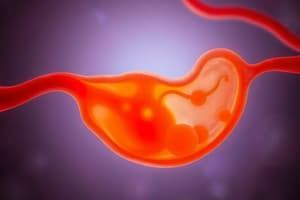Podcast
Questions and Answers
What is the purpose of gametogenesis in human reproduction?
What is the purpose of gametogenesis in human reproduction?
- Formation of specialized reproductive cells (correct)
- Formation of 23 pairs of chromosomes
- Formation of embryogenesis
- Formation of zygote
Which process involves the fusion of a sperm and an ovum to form a zygote?
Which process involves the fusion of a sperm and an ovum to form a zygote?
- Gestation
- Fertilization (correct)
- Gametogenesis
- Embryogenesis
What is the result of genetic recombination during human reproduction?
What is the result of genetic recombination during human reproduction?
- Formation of 46 chromosomes
- Formation of gametes
- Formation of zygote (correct)
- Formation of embryogenesis
During human reproduction, fertilization of the ovum by the sperm occurs to form a _______.
During human reproduction, fertilization of the ovum by the sperm occurs to form a _______.
What is the process called when specialized reproductive cells called gametes are created?
What is the process called when specialized reproductive cells called gametes are created?
What is the typical gestation period for a human pregnancy?
What is the typical gestation period for a human pregnancy?
Flashcards
Gametogenesis
Gametogenesis
The process of creating specialized reproductive cells called gametes (sperm and egg).
Fertilization
Fertilization
The fusion of a sperm and an ovum (egg) to form a zygote, the first cell of a new individual.
Zygote
Zygote
The first cell of a new individual, formed by the fusion of a sperm and an egg.
Gestation Period
Gestation Period
Signup and view all the flashcards
Genetic Recombination
Genetic Recombination
Signup and view all the flashcards
What is the result of genetic recombination during human reproduction?
What is the result of genetic recombination during human reproduction?
Signup and view all the flashcards
Study Notes
Gametogenesis in Human Reproduction
- Gametogenesis is the process of creating specialized reproductive cells (gametes) for sexual reproduction.
- It ensures the formation of haploid gametes, containing half the number of chromosomes as somatic cells, necessary for successful fertilization.
Fertilization
- Fertilization is the fusion of a sperm (male gamete) and an ovum (female gamete) to form a zygote.
- This process marks the beginning of a new human life.
Genetic Recombination
- Genetic recombination occurs during meiosis in gametogenesis.
- It leads to offspring inheriting a unique blend of genetic material from both parents, resulting in genetic diversity.
Zygote Formation
- Fertilization of the ovum by the sperm results in the formation of a zygote - the first cell of a new individual.
- The zygote contains the complete genetic blueprint for the developing embryo.
Gestation Period
- The typical gestation period for a human pregnancy is approximately 40 weeks (280 days).
- This period encompasses the entire developmental process within a mother's womb, from fertilization to birth.
Studying That Suits You
Use AI to generate personalized quizzes and flashcards to suit your learning preferences.




